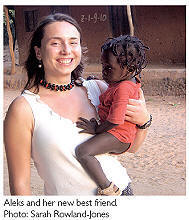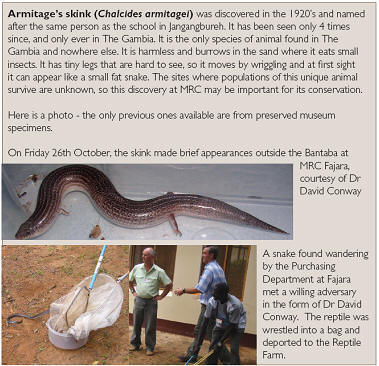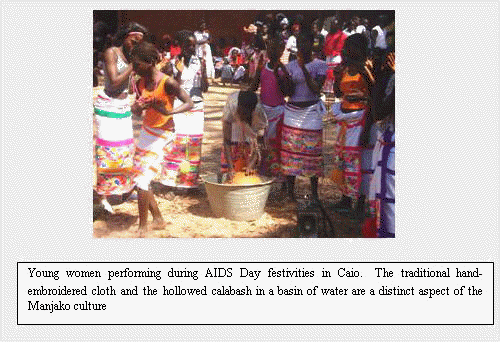|
Aleksandra Leligdowicz
July.2007
A meandering journey to
Caio, Guinea Bissau
The blaring Land Rover’s
horn signals the beginning of my umpteenth journey along the long road
from The Gambia, through Senegal and into Guinea Bissau. Although the
familiar border crossings and check-point guards do not change and the
vehicle ferry is always predictably unpredictable, circumstances alter
on each trip. What I have learned from facing the complications
encountered on each journey, has made my attempts to unravel the role of
the immune system in the attenuated disease course of HIV-2 infection
seem less daunting.
 The road is dotted with landmarks that serve as street signs where maps
do not exist. Out of The Gambia and into the Southern part of Senegal,
the Casamance, we pass the first landmark where once our 1000 liter
empty water tank tumbled from the Land Rover’s roof rack. It’s high
tide in Ziguinchor and to get into the city, we first need to transverse
the waters that submerge the cobble stone highway. We’re lucky, the
Land Rover is a sturdy vehicle and can handle any terrain, the Peugeot
504 Sept-Place local taxis are not so fortunate and need to wait for the
estuary water to recede. Next stop, Casamance River ferry crossing –
it’s lunch time. Luckily, the unreliable ferry is working today and we
are spared the additional 10-hour drive around the river. During the
2-hour wait in mid-day sun, I do my usual routine: grab a blunt knife
and carve out oysters from their hot, freshly smoked shells with the
women working at the muddy river bank, add a close-up photo to my pig
snout collection, and buy 5 packs of cashew nuts (fresh, unprocessed,
beyond coffee shop standards). We make it onto the first ferry after
the lunch break, with the Land Rover strategically balanced with its
back wheels suspended off the edge of the ferry’s landing ramp. Once on
the other side of the river, we come across the next landmark, the place
where with the aid of rope and light from our mobile phones, we repaired
the steering of the truck that transported our laboratory equipment.
We’re close now, the next turn-off leads to the last village in the
mangrove swamp before the Atlantic, our destination! The last leg of
the journey is the most spectacular, with the rows of impressive
mahogany trees planted by the Portuguese lining a red dirt road
scattered with cows enjoying the late afternoon warmth. During the
rainy season, driving on this dirt road in a Land Rover is an
experience: it’s the closest one can get to Willy Wonka’s adventures
while driving through chocolate milk-like puddle lakes.
The road is dotted with landmarks that serve as street signs where maps
do not exist. Out of The Gambia and into the Southern part of Senegal,
the Casamance, we pass the first landmark where once our 1000 liter
empty water tank tumbled from the Land Rover’s roof rack. It’s high
tide in Ziguinchor and to get into the city, we first need to transverse
the waters that submerge the cobble stone highway. We’re lucky, the
Land Rover is a sturdy vehicle and can handle any terrain, the Peugeot
504 Sept-Place local taxis are not so fortunate and need to wait for the
estuary water to recede. Next stop, Casamance River ferry crossing –
it’s lunch time. Luckily, the unreliable ferry is working today and we
are spared the additional 10-hour drive around the river. During the
2-hour wait in mid-day sun, I do my usual routine: grab a blunt knife
and carve out oysters from their hot, freshly smoked shells with the
women working at the muddy river bank, add a close-up photo to my pig
snout collection, and buy 5 packs of cashew nuts (fresh, unprocessed,
beyond coffee shop standards). We make it onto the first ferry after
the lunch break, with the Land Rover strategically balanced with its
back wheels suspended off the edge of the ferry’s landing ramp. Once on
the other side of the river, we come across the next landmark, the place
where with the aid of rope and light from our mobile phones, we repaired
the steering of the truck that transported our laboratory equipment.
We’re close now, the next turn-off leads to the last village in the
mangrove swamp before the Atlantic, our destination! The last leg of
the journey is the most spectacular, with the rows of impressive
mahogany trees planted by the Portuguese lining a red dirt road
scattered with cows enjoying the late afternoon warmth. During the
rainy season, driving on this dirt road in a Land Rover is an
experience: it’s the closest one can get to Willy Wonka’s adventures
while driving through chocolate milk-like puddle lakes.
Guinea Bissau is a small country of 1.5
million inhabitants on the West coast of Africa, with a mainly rural
population distribution. It is one of the 5 poorest countries in the
world - according to the 2005 UN figures, the gross national income per
capita was £90, less than £0.25/day. Civil unrest has affected the
nation since it won independence from Portugal in 1974. In 1999, a
ferocious civil war changed the lives of many people; thousands were
killed, wounded, or displaced. However, despite the grim past and the
present political and economic difficulties, the isolated country is
rich in mystic traditions and music.

Clap-clap, clap-clap. We’ve reached the end of our journey
to Caio, a remote village in the northwestern part of Guinea-Bissau.
The rhythmic clapping from the first ceremonial site trickles through
the windows of our car as women prepare for an evening of merriment.
It’s 7pm when we reach the center of the village and the area is
relatively empty compared to the vibrant tempest of people during Mardi
Gras weekend, no one is cross-dressed today either. Our arrival
coincides with the return of women from the port in the mangrove swamp,
each skillfully carrying a 30 litre basin filled with the evenings catch
of bagre (cat fish) on her head. A combination of the distinct music of
clapping hands, the sight of women at work carrying babies on their
backs, and the warm welcome of old friends make it easy to forget the
arduous 12-hour drive to Caio.
Tomorrow is
International AIDS Day and the village children will participate in
plays, games, and karaoke. The schools from each of the 10 zonal
subdivisions will perform, with the youngest age groups being most
represented as less than 40% will have the opportunity to complete
education beyond 5th grade. A cow was sacrificed this
afternoon for the post-celebration feast and vultures are now circling
the roof rack of the car where the cow’s head is deliberately laid. A
friend tells me it’s placed there to keep the hyenas from reaching it
during the night, not a great relief considering the car is parked next
to the hut where I am staying. The head will be used for preparing a
delicacy, post-party soup; it must be kept safe!
Over the past 25 years,
more than 60 million people have been infected by HIV. Even though the
epidemic is rampant in parts of Sub-Saharan Africa, its spread has not
affected West Africa to the same extent. In Guinea Bissau, an estimated
4-7% of the population is HIV-positive. Antiretroviral therapy is
widely available in developed world and much of Africa. Guinea Bissau,
however is among the few countries where therapy has not reached
outskirts of the capital. Medication from the Brazilian government has
been available in the capital for 2 years, yet the dismal health care
infrastructure and the low numbers of physicians in the rural areas have
caused a long delay on the plans for drug distribution. The
HIV-positive people of Caio are fortunate to be included the first
roll-out of the drugs as Caio is one of the few villages with a
permanent physician and the patients are amongst the minority for whom
HIV diagnosis is available.
The atmosphere in Caio
today is festive; children are competing and singing in tune with Dulce
Neves, a local pop star, while adults cheer them on. Life in the
village is like this on a daily basis. Families share everything
although they have so little. All plastic waste can be reincarnated for
a new purpose. Even at night, when the village is at complete peace, or
in the early morning, no children’s cries can be heard.
On my first visit to Guinea
Bissau, I did not experience the peace that I now associate with the
country as it is difficult to see past its external poverty. The
capital has a strong colonial aftertaste with deteriorating architecture
reminiscent of the past mix of Afro-Portuguese culture. What remains is
decaying buildings, bullet hole-ridden palaces, and a new flavor of
design like the State House financed by the Chinese government.
However, the reservation I initially experienced has changed into a deep
appreciation of the citizens of Guinea Bissau who despite staggering
unemployment, illiteracy, and high childhood mortality rates redefine
the meaning of carpe diem.
The religious beliefs of
Caio’s inhabitants have largely remained free from influence from the
outside world. Conversion to organized religious practices (Islam and
Catholicism) is uncommon as 99% of the population believes in Earth
spirits and ancestral cults. The preservation of traditional customs
likely results from the limited influx of outside impact as
transportation to the village is relatively inaccessible, infrequent,
and long. In addition, to date, there is no land-line phone
communication and a mobile network can only be accessed under a handful
of mango trees, where one can only make outgoing calls. No one has
access to electricity unless a generator is owned by the family, making
television and telecommunication a sci-fi fantasy. Yet as foreign as
the use of Western gadgets is to the people of Caio (mobile phones,
ipods, digital cameras, computers, plasma screen TVs), so is to us their
faith in the forces of Nature.
After the AIDS Day
festivities are over, preparations begin for appeasing the spirits. On
our next visit, the study on which my PhD depends will begin and prior
to its commencement we must keep the local tradition of providing an
offering to Iran, the greatest spirit. Staff of the field station have
arranged for two pigs for the sacrificial ceremony and each will meet
the blade of a medicine man tonight. I am requested to be present at
the first ritual but forbidden at the second that will take place in the
sacred forest where only males are allowed to enter. After the symbolic
pouring of red wine and palm wine over a sacrificial post accompanied by
Manjako chants, in one stroke of the machete blade the pig’s throat
oozes blood over the white post. The pig ends its life and darkness
ensues as the blazing sun sets past the rice field horizon. The men
proceed to scorching the pig’s hair off and partitioning the meat and
leave the cooking to the women. Everyone present respects the fact I am
vegetarian, I must respect the fact I am obliged to participate and eat
the pig’s heart.

Ceremonies form a
fundamental component of the Manjako culture. When seeking revenge or
protection from illness, sacrificing a chicken to the bush spirits may
suffice. More substantial offerings of dozens of goats, pigs, and cows
are reserved for sacred rituals such as male initiation rites that take
place every 10 years over 3 month period with an exclusively male
participation. Funerals, especially those of “kings” (headmen of a
family court), call for celebrating the life of the deceased person with
the age of the departed determining the extent of the celebration.
However, since the average life expectancy in Guinea Bissau is under 45
years, funerals of elders are rare. The ceremonies are of symbolic
importance but they are also a perfect excuse for feasting and dancing.
The moon is
full tonight. Walking back from the sacrificial ceremony into the
mysteriously illuminated village I begin to appreciate the lessons I
learned here and start to understand their full significance. The
people I now know disclose with certainty and wisdom their awareness of
the complexity of existence. I feel privileged to have been introduced
to their concept of the value of life and hope that in the future,
results of our studies might help to improve the health of this
remarkable village.

|

